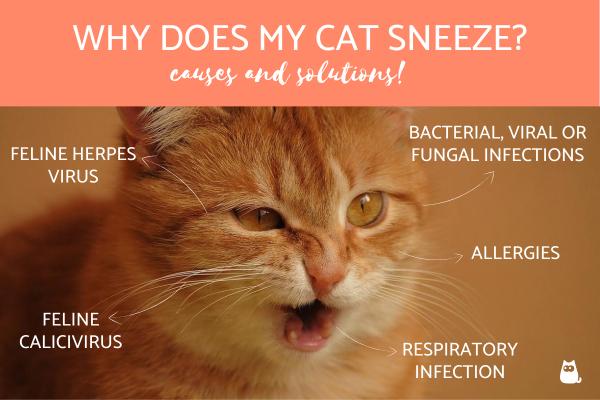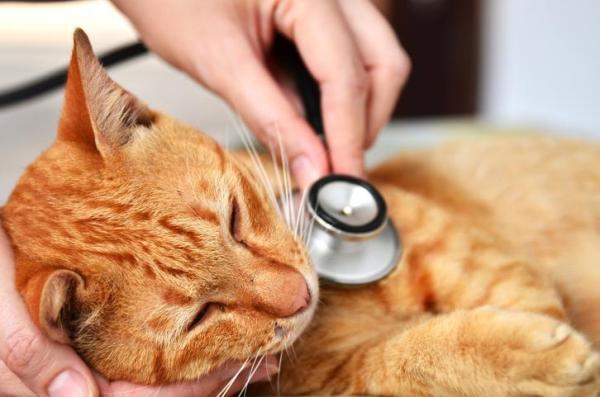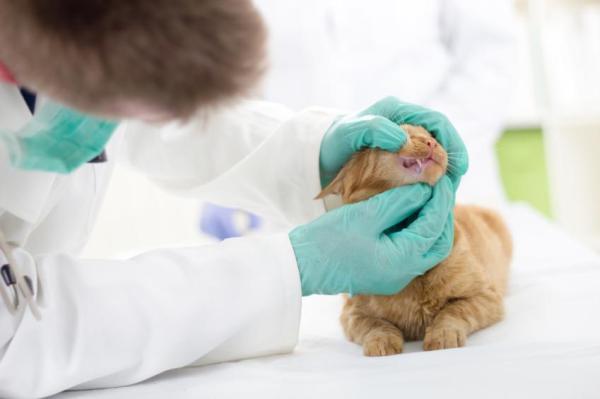
It's common to see our cat sneeze here and there. Just like us, cats will sneeze when their nasal passages are irritated. However, what does it mean if your cat has started to sneeze a lot? There are a number of reasons why your cat may have begun to sneeze a lot. It's usually a symptom indicating an underlying health issue.
In this AnimalWised article we're going to explain why your cat sneezes, the different causes and solutions.
Why do cats sneeze?
Just like other animals, cats sneeze when their nasal passages are irritated. It's normal for your cat to sneeze every once in a while. This can be due to a simple nose tickle, dust particles or a certain chemical in the air.
However, if your cat is sneezing more than usual this can be a sign of an underlying health issue. Sneezing can be accompanied by other symptoms that demonstrate that your cat is suffering a health problem. It's important for us to observe our cat's behavior and watch out for any abnormalities.

Causes of sneezing
Feline herpes virus
Cats can get infected by being exposed to other cats who have herpes. Some of the common symptoms are sneezing “attacks”, discharge from nose and eyes, fever, depression, eye ulcers, pink eyes, etc. It should be clear that feline herpes is not contagious to humans.
Feline calicivirus
This virus is highly contagious between cats. Some of the common symptoms are sneezing, nasal congestion, discharge from eyes and nose, inflammation in tongue, etc. This virus can even cause pneumonia.
Allergies
If your cat is allergic to something, they will probably experience itchy skin. Although sneezing due to allergies is less common in cats than in humans, it's still a possibility. Try to observe if they tend to sneeze and scratch themselves in similar situations.
Upper respiratory infection
Sneezing is a common symptom of upper respiratory infection (UPI). This is often referred to as the “feline cold or flu” and last anywhere from 7-21 days. Other symptoms include discharge from nose or eyes, coughing, fever, dehydration or loss of appetite.
Feline infectious peritonitis
Interestingly enough, this infection may not present symptoms, it may also present mild or even severe infections. It will depend on each cat. Unfortunately, FIP is difficult to diagnose in most cases. It is also fatal in almost all cases.
Feline immunodeficiency virus (FIV)
This virus develops slowly but severely impacts a cat's immune system. Therefore, it will also leave the cat vulnerable to other infections. Other symptoms include diarrhea, fever, weight loss, enlarge lymphs nodes, hair loss and more. This virus is also not infectious to humans.
Feline leukemia
This serious and, almost always, fatal infection only affects cats. Like many other infections, it's transmitted through urine, feces, saliva and blood. Other symptoms include pale gums, yellow color in their mouth, poor coat condition, enlarged lymphs nodes, fever, diarrhea, trouble breathing, progressive weakness, etc. Learn more in our article about feline leukemia.
Feline chlamydia
The classic symptom is a persistent conjunctivitis. This is an inflammation of the pink lining of the eyelids and transparent covering of the eyeball. It commonly starts in one eye only, before spreading. Other than sneezing, other symptoms include nasal discharges, fever and loss of appetite. Thankfully, death from chlamydiosis alone is rare. With the proper treatment, the cat should recover quickly.
Feline bordetella
Feline bordetellosis is a highly contagious respiratory disease caused by the bacteria Bordetella bronchiseptica. Other symptoms include coughing, nasal and ocular discharge and fever. Signs typically last 7-10 days. However, in occasional cases (especially in young kittens) infection may be more severe and can sometimes result in life-threatening pneumonia.
Feline mycoplasma
This is a relatively uncommon infection in cats.The major transmission route of FHM is thought to be biting, blood-sucking parasites such as fleas.
Sneezing and other symptoms
As we've previously mentioned, cats that are sneezing a lot may also present other symptoms that indicate an underlying health issue. These symptoms may include:
- Eye discharge or swelling
- Excessive nasal discharge
- Fatigue or depression
- Fever
- Drooling
- Decreased appetite
- Enlarged lymph nodes
- Wheezing or coughing
- Poor coat condition
- Trouble breathing
- Diarrhea

Visiting your veterinarian
If your cat sneezes once but doesn't display any other symptoms, you shouldn't worry as it must've been dust or another airborne particle. However, if your cat is sneezing continuously and is even experiencing other symptoms, it's time to visit the veterinarian.
Then, your veterinarian will be able to examine and diagnose your cat. They will also find the correct treatment for the indicated illness. In mild cases, your veterinarian will tell you to use a humidifier at home or be aware of an allergy your cat has. In other cases, antibiotics, nasal decongestants, steroids, or fluids may be needed. In rare cases, your veterinarian may need to perform surgery on your cat if the medical therapy isn't successful.
Effective home remedies for sneezing cats
If you observe your cat continuously sneezing, you should bring them to their veterinarian for a check-up to make sure it's not a serious disease. Especially if they are presenting other symptoms. Early detection and diagnosis will help treat the health issue early on before it gets too serious.
Lastly, we want to share this video from the veterinarian Dr. Andrew Jones where he explains effective home remedies for sneezing cats. He will also speak about the feline herpes and how to tell if your cat has this condition. With that being said, it's always best to go to a veterinarian in person so your cat can be examined and treated by a professional.

This article is purely informative. AnimalWised does not have the authority to prescribe any veterinary treatment or create a diagnosis. We invite you to take your pet to the veterinarian if they are suffering from any condition or pain.
If you want to read similar articles to Why Does My Cat Sneeze?, we recommend you visit our Breathing diseases category.
- Etienne Thiry, Diane Addie, I.-S. (2009). Feline herpesvirus infection. ABCD guidelines on prevention and management, Journal of Feline Medicine & Surgery. Volume 11, Issue 7.
- Alan D. Radford, Karen P. Coyne, Susan Dawson, I. -S. (2007). Feline calicivirus, Respiratory iruses of domestic animals. DOI: 10.1051/vetres:2006056